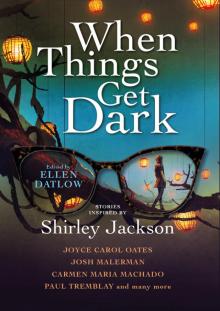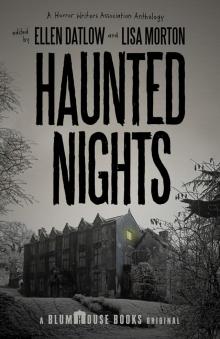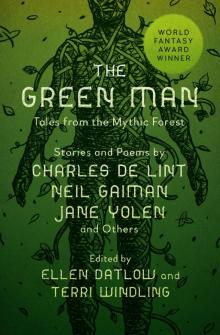- Home
- Ellen Datlow
When Things Get Dark Page 6
When Things Get Dark Read online
Page 6
It does not want us there.
There are places, liminal places, where the walls grow thin, where the deep heart of the woods can abut upon what has been tamed and tapered down, claimed and collected; places neither civilized nor free, where the sun can shift in an instant, to correspond with the passing of a cloud or the lighting of a match. In these places grow the strange ones, humans who can breathe in both the sweet treacle sunlight of the modern world and the deep, rich, cruel sunlight of the ancient one. They are children of a stranger sun, but they are human still, and their desires matter no less than the desires of their citified cousins. Their needs are no less important or essential.
It is only when those needs collide with the needs of the softer world that trouble can be found.
They walk the deep woods, the places where the light hangs heavy in the trees and the dark hangs heavier still; and what they want and what they dream of is the business of the deep woods and the deep woods alone, and the question they are never asked, and would never answer if they were, is a simple one: if the sunlight is so transformed by its fall into the deep, dark woods, what do they do to the moonlight? What does the night become?
What transformations can such light wreak in its own right, in its own time?
They smile and they know their place and they walk in shadows made of light, and they are perfect and they are profane, and they would not forgive us if they could.
* * *
The lake house hadn’t been used in some time; that much was clear as soon as the door was opened, sending a puff of stale air and dust billowing out onto the porch. Millie recoiled, unable to quite believe that the place had been allowed to regress into such a state of disrepair. What was the point of the caretakers her grandfather had arranged, the ones whose fee was dutifully deducted from her trust fund three times a year, when the seasons changed and they were meant to air the place out, keeping it ready for human habitation. She fought back the desire to pull out the letter she had already read easily a dozen times, the one that promised this place would be prepared for her arrival.
Well, if this was prepared, she wasn’t sure she could understand what had driven her grandparents to spend every summer by this lake, right up until the year they disappeared. Her father always spoke of the lake house as a bucolic paradise, a necessary respite from the speed and stress of city life. Without it, he’d told her once, he would have gone quite mad in the aftermath of his divorce from her mother, when she had seemed to permeate every square inch of the city, turning a wide, clean world into a small and filthy enclosure. Only by getting as far from her concrete cage as he possibly could had he been free of her.
Millie hadn’t been able to follow. She’d been too young, and the custody agreement between her parents forbade either one of them to take her out of the state without written permission. She’d hated it as a child, hated being left behind, hated knowing that her mother was forbidding her the lake house out of spite, and that in so doing, had driven her father to forbid her summers at Walt Disney World, winters in Paris, any number of other little luxuries that she, as the child of two well-off New Yorkers, had every reason to feel were her due. Somehow he had always managed to make the lake house seem equal to those grand adventures, to make the punishment fit the crime, even though the crime had never been hers, and the punishment always, inevitably, had.
And now here she is, finally, and her father is gone to the worms and the rot, and her mother is gone to the fire and the wind, one buried, the other cremated, and she stands alone. Her divorce has been finalized, her name sundered from Marcus’s forever. She has no family left in the world, and nothing but their combined bank accounts to comfort her through the long, lonely nights. Well, those, and the lake house, which is finally hers to have for her own.
As long as she doesn’t mind sharing it with the moths and spiders, it seems.
The gust of foul air has subsided. Picking up her suitcase one-handed, aware that she is, for all intents and purposes, trapped here— the phone line was disconnected years ago for lack of payment, and while she’s working to have it reestablished, things here in the country happen at a fraction of the speed the city considers “slow.” She’ll be lucky if she has a dial tone by August. And apart from that, the driver who brought her here has returned home by now, leaving her alone in what might as well be another century, to say nothing of another country. No. Her mother made the city a cage to keep her, and she has willingly traded it for the cage of her father’s design, which may be of a different shape and size, but which has just as many bars on the windows, and just as many walls.
But it doesn’t contain any angry ex-husbands who like to settle their arguments with their fists, and it doesn’t contain any easy means of tracking her down, and with those thoughts reigning over all others, she squares her shoulders and steps through the open door, into a room full of ghosts.
For a moment, in the hazy sunlight that filters through the windows, filled with dancing motes of dust that seem almost too large to be real, she is absolutely standing in a haunted house. A scream bubbles up in her throat, momentarily trapped behind the cemetery gates of her lips, and she knows that when it breaks loose it will be large enough to shake down the walls. The specks of light catch and hold her gaze, yanking it away from the specters surrounding her. She used to see fairies like this in her childhood, in the days when she bedeviled nannies and lived in what her mother termed “a form-fitting fairyland,” a place filled with only peace and magic and no divorce, no warring parents, no miseries at all.
Then she blinks, and the fairies are dust motes again, and the dust motes are fading into the background, and the ghosts are furnishings covered in dusty white sheets, as old and unused as the rest of this place. The money she’s been paying for upkeep has been going to line the pockets of her so-called caretakers if it’s been doing anything, obviously enough, because they haven’t raised so much as a finger to prepare the place for her arrival. She told them she was coming, she knows she did. She sent three letters and called twice, and she distinctly remembers receiving at least one reply.
Or she thinks she did. It could be hard to tell, on the long and empty afternoons in her apartment in the city, what was fact and what was supposition. She supposes the afternoons will be just as long here, and just as lonely, with her driver already gone; these walls will be her new cage, one she finds far more pleasant than the dangers of the city.
Her mother warned her, before she died, told her Marcus seemed like the sort of man who might turn cruel if she stopped giving him what he wanted, but since what he wanted was a young, beautiful, independently wealthy wife with which to dazzle his competitors, she had chalked her mother’s warnings up to the ramblings of a bitter old woman whose own marriage had collapsed and left her with nothing better to do than torture her only child, since her actual friends had long since died, rendering them unavailable for her lectures.
She hadn’t known then—couldn’t have known—that one day Marcus’s demands would shift to sons and heirs, children born of his seed and her body’s labors, to carry on his family name, made great and glorious by her coffers and his business acumen. And she couldn’t have known that her body would be opposed to this idea, would refuse to give him any heirs to call his own, but least of all the son he so eagerly demanded. She couldn’t have known that after five years of failures, he would turn to making his wishes known with his fists, and with the backs of his hands, and on one dark occasion with his boots, leading to kidney damage, a weekend in the hospital, and finally, at long last, the divorce papers her lawyer had been urging her to file for over a year.
Thankfully, their prenuptial agreement had been drawn up by lawyers far more expensive than he could afford on his own, and she’d been able to walk away with most of her fortune intact, shielded from his grasping hands by restraining orders and legal paperwork. She’d escaped with her money and her reputation, and all it had cost was the city she loved so much.
Well, nothing to be done for it now. This is to be her home, at least for the next six months, and maybe longer than that, depending on the lawyers and the progress of their suits. She turns and grasps the nearest white winding sheet, whipping it away from the antique fainting couch it covers like a dinner theater magician revealing the table during his eight o’clock show. It’s a swift, flashy gesture, wasted on the empty room, and she has a moment to feel like she’s accomplished something before the cloud of dust that it releases invades her mouth and nose and sends her choking back onto the porch, looking through the open door at the cloudy, sun-streaked room.
“Ms. Ellis?”
Millie turns.
The voice belongs to one of the local youths, a broad, friendly-faced teen of no obvious gender, dressed in overalls and a ruffled plaid shirt. Their hair is short-cropped and very red, with two separate cowlicks at the front. As a child, she would immediately have made them out to be devil’s horns, and spun a whole backstory to explain why an imp was walking among the mortal men of this small lakeside town, no doubt granting ill-advised wishes and tempting children into mischief.
“Yes?” she asks, and takes a step down from the porch, onto the second stair, which is rickety and filled with splinters. “Are you the caretaker?”
“No, ma’am, that’s my dad,” says the teen. “I just go fishing down off your dock sometimes, or I did, anyway, when you weren’t here to need the fish…” They duck their head and look at Millie through their lashes, clearly waiting for permission to continue their fish-filching ways.
If they were a mischievous imp, what would the correct answer be? Permission to keep stealing fish could be taken as permission to steal whatever they liked, but refusing permission when they weren’t hurting anything or taking anything she needed for herself would just be an act of selfishness, and imps, like most fey creatures, didn’t care for mortal selfishness. Millie finds her answer and her smile at the same time.
“If you’ll teach me how to fish in these waters, you can fish here anytime you’d like,” she says.
Her smile is returned, amplified into something bright enough for dust to dance in. “That’s awfully kind, Ms. Ellis. Most city folk aren’t so accommodating.”
“This was my father’s place before he died,” she says. “I’m sorry I haven’t been here before now. I was…” Married? Busy? Trapped by the expectations of a mother who had done her best to create the impression that anything outside the city was filthy and provincial and not worth pursuing? “…otherwise occupied,” she finishes awkwardly, and the words are dust and ashes in her mouth. She wants to spit them out, to see them dancing in the sunbeams with the rest of the filth.
The teen doesn’t appear to judge her for it, only shrugs and says, “You’re here now, start of the summer and everything. We’ll be glad to have you for a neighbor, and you’ll have plenty of time to learn the way of things before the season changes and you go back to the city.”
Millie blinks. Maybe her instructions weren’t clear, when she asked them to prepare the property. “I’m sorry,” she says. “There seems to have been some confusion. I’m not intending to—”
But the teen has turned toward the lake, chin up and nostrils flaring, like a hunting dog that’s caught the scent of a rabbit. “I’m sorry,” they say, glancing back to her. “Papa needs me. I’ll see you tomorrow, I’m sure, since I’ll be helping to bring your groceries in. Sleep well, Ms. Ellis!”
And they’re off, loping toward the lakeshore with a curious rollicking gait, reminding her even more intensely of a hunting hound, now returning to its master’s side. When they don’t so much as look back, she sighs, and turns to the lake house full of dust and sheeted furniture and ghosts and ghosts and ghosts.
So many ghosts, and some of them have names and some of them have faces and some of them only have whispers from her father on dark winter nights, stories with nothing to support them. She moved here for a haunting, and, even if the house refuses to be haunted, she fully intends to be.
Millicent Ellis climbs the porch steps to the door and willfully, intentionally, shuts herself inside.
* * *
Cleaning up enough to make the bedroom habitable takes the rest of the daylight hours, culminating in the unwelcome discovery that in addition to everything else that hasn’t happened, the power has yet to be restored. If her keys hadn’t fit the lock, she’d be wondering whether she was in the wrong house—the money for the caretakers must have been going somewhere, and she knows she was very clear about her intentions when she wrote to them. None of this is what she was promised.
But her bedroom has a perfect view of the lake, and the water is beautiful in the moonlight, flat and bright and clean as hammered silver. She could look at it for hours. With no power to read by and no television to watch, she might have to. Laughing a little, she turns back to the small room she’s chosen as her own.
The lake house is large enough to host a much larger family than just her—or even just her and her husband, if he was still a welcome part of her world—and despite her grumbling about the lack of housekeeping, the caretakers have clearly been maintaining the structure; the walls are straight, the eaves are sound, and the windows admit no drafts. She wraps herself tight in a roll of blankets that still smell faintly of her grandmother’s perfume, and she slides into slumber as smoothly as a seal sliding into the sea, going under without a splash.
She doesn’t consciously hear the sound that wakes her some hours later, only opens her eyes on the dark room with the moonlight sleeting through the window. The house is silent around her, and she begins to close her eyes again, to return to sleep, only to freeze as she hears the soft scuff of a boot sole against bare wood. Someone is in the lake house. Someone other than herself, alone. No one here is alone. Not the house, not the intruder, not Millie. They are together, the three of them united by coincidence of place. Not so coincidental: Millie came here entirely on purpose, and this place has sat empty and undisturbed for so long that anyone who walks here now must have come seeking something that hadn’t been present the day before.
They must have come looking for her.
She finishes putting the pieces together and slides silently out of bed, bare feet meeting bare wood, to creep toward the antique wooden wardrobe against the far wall. It’s still full of her departed grandmother’s summer wardrobe, vintage dresses and coats sliding down the steep hill toward antique as they sat, untouched, for year upon year. She inches the door open as she hears the footsteps near, moving down the hall toward the room where she was sleeping.
Into the wardrobe she slips, wrapping herself in the silks and linens of the past, and holds her breath, as much from fear as from the dust. The footsteps grow closer and closer still, until she’s sure their owner is in the room, bathed in the thick silver moonlight through the window.
A branch snaps. Something—a dog, most likely, or perhaps a coyote—howls in the woods outside the window. The footsteps draw closer and closer still, and she tenses, wishing she had anything that could serve her as a weapon. But there’s nothing, there’s nothing, there’s nothing here in this tattered world of someone else’s discarded fashions. She can’t defend herself with a sundress, no matter how daring it may have seemed when it was first worn.
The dog or coyote howls again, closer this time. The footsteps stop, and she hears three things in quick succession.
Hears the window sliding closed, locking the sounds of the night outside, away from her, leaving her trapped in a space that manages to feel even smaller than the wardrobe. Hears the footsteps resume, coming closer and closer, the tread now even and familiar. She knows the man who’s coming toward her, and of course she does; of course there was never any real question of who would have followed her here, past the ends of what city people see as the entire world, into this lakeside dream where the sunlight falls like honey and attracts almost as many flies.
And finally, she hears the clacking of claws against the hard
wood floor, also coming closer, moving more than twice as quickly as the footsteps. There’s an animal in the house with them. Is it running? She suspects it might be.
The man who has followed her here from the city, the man who has broken into her house, the man who used to be her husband before he sacrificed that title on the altar of his fists, stops walking. She hears the scuff of his heel as he turns.
Then she hears him yell. It’s not a word—it’s a wordless sound of shock and horror. What follows is far more horrible, the wet, visceral sound of tearing meat and breaking bone, occasionally accompanied by the clatter of claws on wood. He screams and screams and screams, but whatever fell beast is tearing him to pieces does so without making a sound beyond those that gravity demands. Eventually, the screaming stops. Millie, who is backed into the corner of the wardrobe, shoulders to the wood and hands clasped over her mouth, is weeping by this point, fat tears forming in the corners of her eyes and breaking free to run down her cheeks and pool at the hollow of her throat. If she makes a sound, she knows, the beast will come for her. If she doesn’t make a sound, the beast will surely come for her, because beasts can smell their prey at much greater distances than the one between the wardrobe and the room.
The clatter of claws continues, now accompanied by what sounds for all the world like the rasp of a tongue against the wood, and still the beast makes no sound, and still Millie holds her screams inside and cries.
Outside, beyond the closed window, the moon shines on.
* * *
Morning finds her stiff and aching from a night spent propped up in the wardrobe. Sometime in the smallest hours of the morning, she slipped into restless sleep, her hands dropping away from her mouth, her tears drying salt-sticky on her cheeks and down the front of her nightgown. She comes out of her curl as silently as she can, but can’t suppress a whimper as the motion pulls at her back. She’s not an old woman yet, but she’s not a young woman anymore, and the events of last night have her wondering whether “old” is even in her future.

 Inferno
Inferno The Best of the Best Horror of the Year
The Best of the Best Horror of the Year When Things Get Dark
When Things Get Dark A Whisper of Blood
A Whisper of Blood Echoes
Echoes Blood Is Not Enough
Blood Is Not Enough Haunted Nights
Haunted Nights The Best Horror of the Year Volume Eleven
The Best Horror of the Year Volume Eleven The Green Man
The Green Man The Dark
The Dark Mad Hatters and March Hares
Mad Hatters and March Hares Nebula Awards Showcase 2009
Nebula Awards Showcase 2009 The Devil and the Deep
The Devil and the Deep